Blind Wiltshire composer creates work inspired by illness
- Published
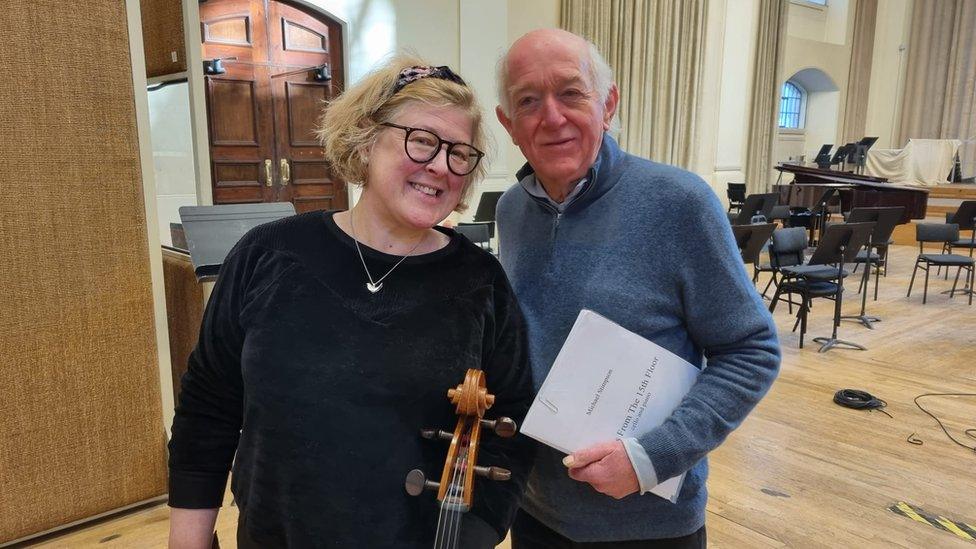
Mr Stimpson had Karen Stephenson - lead cello of the Philharmonia Orchestra feature on the composition
A composer who contracted a rare neurological virus that left him blind has recorded new work about his time in an intensive care unit.
Michael Stimpson, who lives in the Chalke Valley, near Salisbury experienced "horrific" hallucinations while on morphine sick from Guillain-Barré syndrome aged 29.
It left him registered blind and needing to learn to walk again.
Mr Stimpson said: "That illness played such a huge role in my musical life."
"It started on Christmas Day in 1976 when I lifted a cup of coffee to my mouth and it went past my face, which was a bit strange but I was also feeling very unwell," he said.
The 74-year old explained that a few days later he was "staggering along" Fulham Palace Road in London holding on to lampposts and sandwich boards before ending up in Charing Cross hospital where a lumbar puncture confirmed he had Guillain-Barré syndrome.
Guillain-Barré syndrome, external is a very rare and serious condition where the body's immune system attacks the nervous system.
"It went downhill from then, on New Year's Eve I got myself out of my hospital bed to the window and saw a spectacular view across London when my legs gave way and I collapsed to the floor," Mr Stimpson said.
What followed was a gruelling four month period in the ICU because he had become paralysed, slipped into a coma and had also developed breathing problems requiring a ventilator.
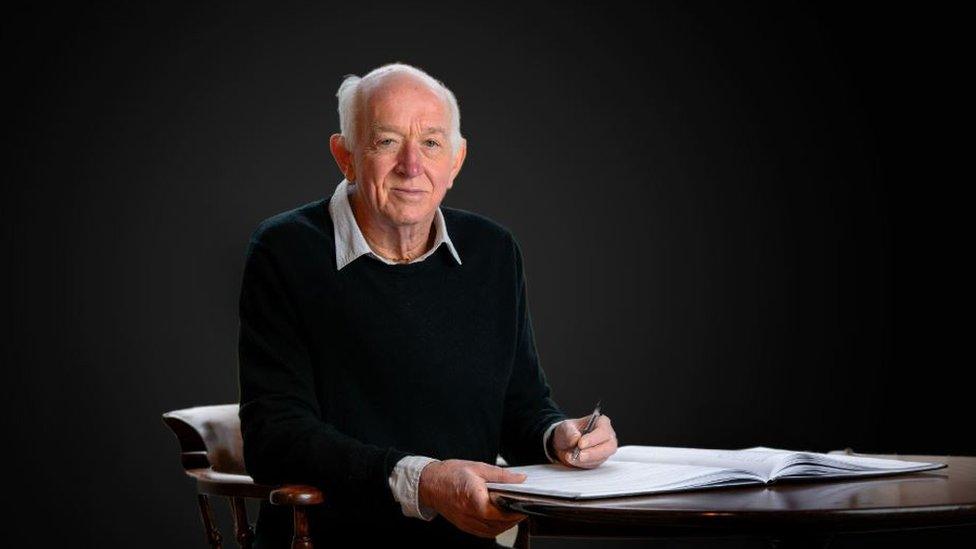
Michael Stimpson, renowned composer, has released a box set of his life works
"The pain was tough and so they kept giving me morphine but it induced some horrific hallucinations.
"I was awoken occasionally that was really the prominent memory of that time," he said.
Mr Stimpson described hallucinations such as being stuck under a dead elephant being trapped in slime and believing Frank Sinatra was trying to kill him, which he thinks took place when he was at his sickest and fighting for his life.
Eventually he did recover after a year of tough rehab and went on to study at the Royal Academy, later earning a Doctorate in Composition.
His illness has inspired one part of an album based on his life works which is being released on 5 October, to time in with his 75th birthday.
It includes a brand new recording of a classical piece called 'When the light shines' inspired by his stint in ICU.
He said: "The CD holds a piece for a cello and piano - 'Tales from the 15th floor' which been recorded by two wonderful players, Karen Stephenson - lead cello of the Philharmonia orchestra and pianist Sophia Rahman.
"That seems to be the focus of the release - that illness left me registered blind and played such a huge role in my musical life."
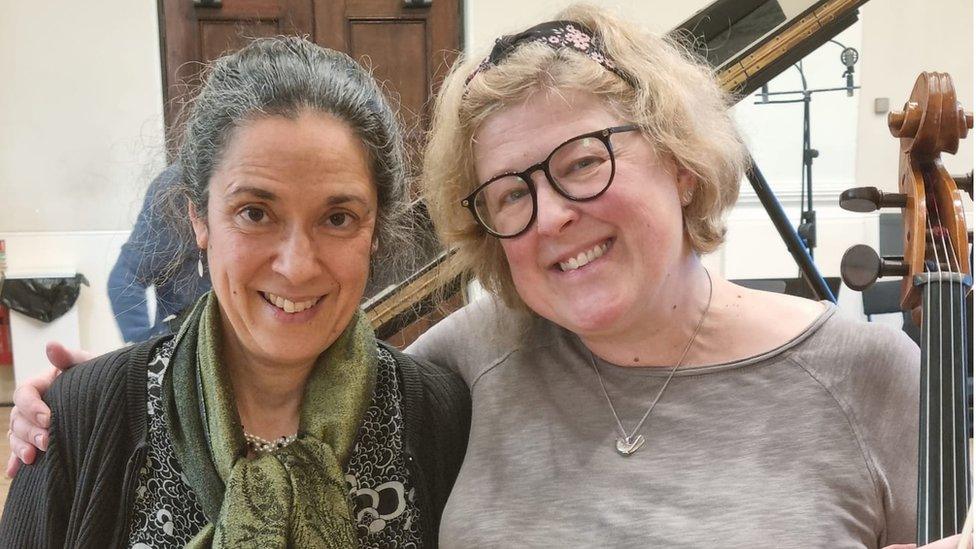
Pianist Sophia Rahman (left) and cellist Karen Stephenson (right) played the music for Mr Stimpson composition inspired by ICU
He explains the music starts with a cello to indicate the fear and unknown he felt of the initial stages of illness, then part of the music sounds like hospital machines and the third movement has links to Frank Sinatra's 'New York, New York' to refer to the hallucination.
Mr Stimpson said: "I think that was one of the lowest points of my being ill, my parents were called in to be told my heart was failing, and I always felt that was the same time as the Sinatra hallucination.
"The music does end in an uplifting way which relates to my last hallucination.
"I was in a large atrium which was very crowded and people were walking through column's to the outside but every so often concrete would smash down and kill people.
"I was aware of a feeling of 'do I take a chance' of getting well again, as by this point ICU was my life.
"Somehow when I left that atrium that was me walking to freedom and I pretty much recovered then and was taken off the ventilator and was ready to leave to normal life."
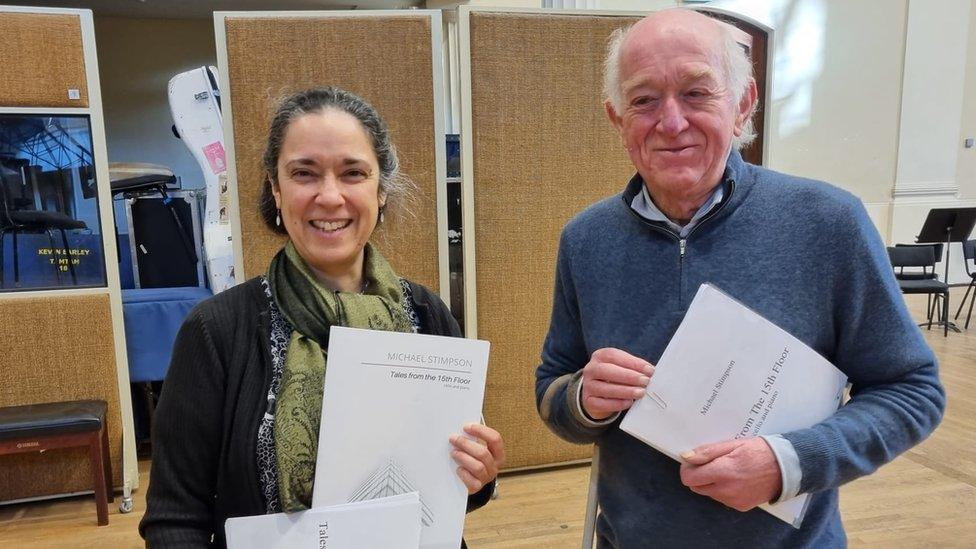
Mr Stimpson and pianist Sophia Rahman recording the music for his latest release
Decades later in 2012 Mr Stimpson was writing Jesse Owens, an opera commissioned for the 2012 Olympics when he was diagnosed with a brain tumour but he said that recovering from that was "easy" compared to what had happened to him in his 20s.
The surgery left him with directional hearing loss, adding another challenge to his work as a composer.
Mr Stimpson remains an active composer and his music has been performed, commissioned, and recorded by the English Chamber Orchestra, the Philharmonia, RPO, London Sinfonietta, and Roderick Williams, among others.

Follow BBC West on Facebook, external, X, external and Instagram, external. Send your story ideas to: bristol@bbc.co.uk , external
Related topics
- Published29 September 2023

- Published26 August 2023
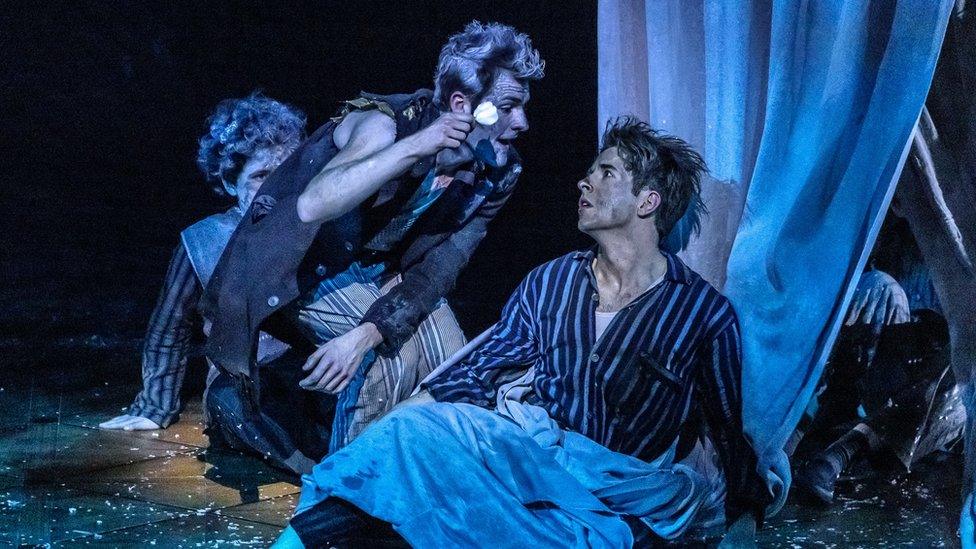
- Published9 September 2023
